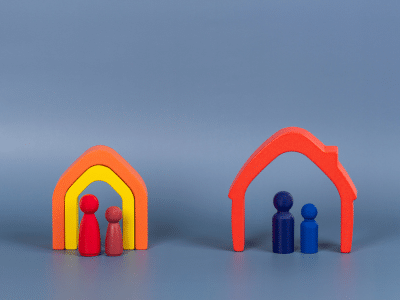
Welcome to the wild and wonderful world of co-parenting–where the decisions surrounding your children require you to involve and engage with someone you may no longer even like. Chances are, if divorce doesn’t make you want to strengthen your boundaries, co-parenting with an ex-spouse/partner will. Here are some things I have learned to keep in mind as you brave this new frontier:
- Let me first start by saying that co-parenting is hard. Putting your children first is not. The honest truth is that all of the decisions you make pertaining to your kids should be for their benefit. Our egos as parents have to take a backseat. But being fair with someone who wants to exert control on what you feel is appropriate for your kids is a constant challenge.
- Keep in mind that building a cohesive parenting relationship with your ex takes time – even in the best circumstances. We are not striving for the kind of relationship where your ex goes on vacation with you, your kids, and your new partner. If you can create that for your family – that’s genuinely wonderful! However, most of us will never have a perfect relationship with our ex. Finding common ground and maintaining it should be the goal.
- You may have also figured out by now that you and your ex-partner may not have the same parenting style. Although communication is necessary to stay informed, this does not mean that you have to display or tolerate snarky responses. Whether you’re talking face-to-face or through text message, using neutral language is the best way to make sure a non-aggressive tone is delivered.
- It’s important to pick and choose your battles wisely. Even as I write this, I’m holding back the series of eyerolls that accompany this statement. As simple as it is and sounds, this comes with its own internal struggle and is based on how vocal we are as individuals. Not everything can be one-sided all the time. There are some battles worth fighting for, but there are moments where keeping the peace is more valuable than gold.
- One way to positively influence this area is to set expectations in how, what, and when you both check-in with the other regarding your children. Creating a detailed schedule or parenting plan can really help both parents to be equally engaged. This becomes more imperative the older your kids get and how involved they are in extracurricular activities.
Remember, that through all the highs and lows you face while co-parenting, your children take notice of the dynamic that exists between you and your ex-partner.
You may also want to keep checking in with your children to see how they are coping with this change. According to Hannah Mulholland, L.I.C.S.W., M.S.W. of the Mayo Clinic, “If you see changes in schoolwork, friendships, behavior or mood, your child may be struggling to manage the change. If your child shows a consistent increase in irritability, sleeping difficulties, toileting or eating problems, then try talking with him or her about how he or she feels about the divorce.”
You can’t always control what your ex does. But you can control how you respond to them and the communication style and behavior you model for your children.
Disclaimer: The views and opinions expressed on Annapolis Moms Media and its affiliates are those of the authors and/or experts and do not necessarily reflect the official policy or position of Annapolis Moms Media. Any content provided by our bloggers or authors is of their opinion and is not intended to malign any religion, ethnic group, club, organization, company, individual, or anyone or anything.
The published article is available for informational purposes only and is not considered licensed professional advice on any subject matter. By viewing articles/blog posts, the reader understands there is no client relationship between the reader, the publisher, and its authors. The article/blog should not be used as a substitute for professional advice from a licensed professional, and readers are urged to consult their own counsel on any specific questions concerning a specific situation.





 How to Know if Your Kid is Ready for Sleepaway Camp
How to Know if Your Kid is Ready for Sleepaway Camp